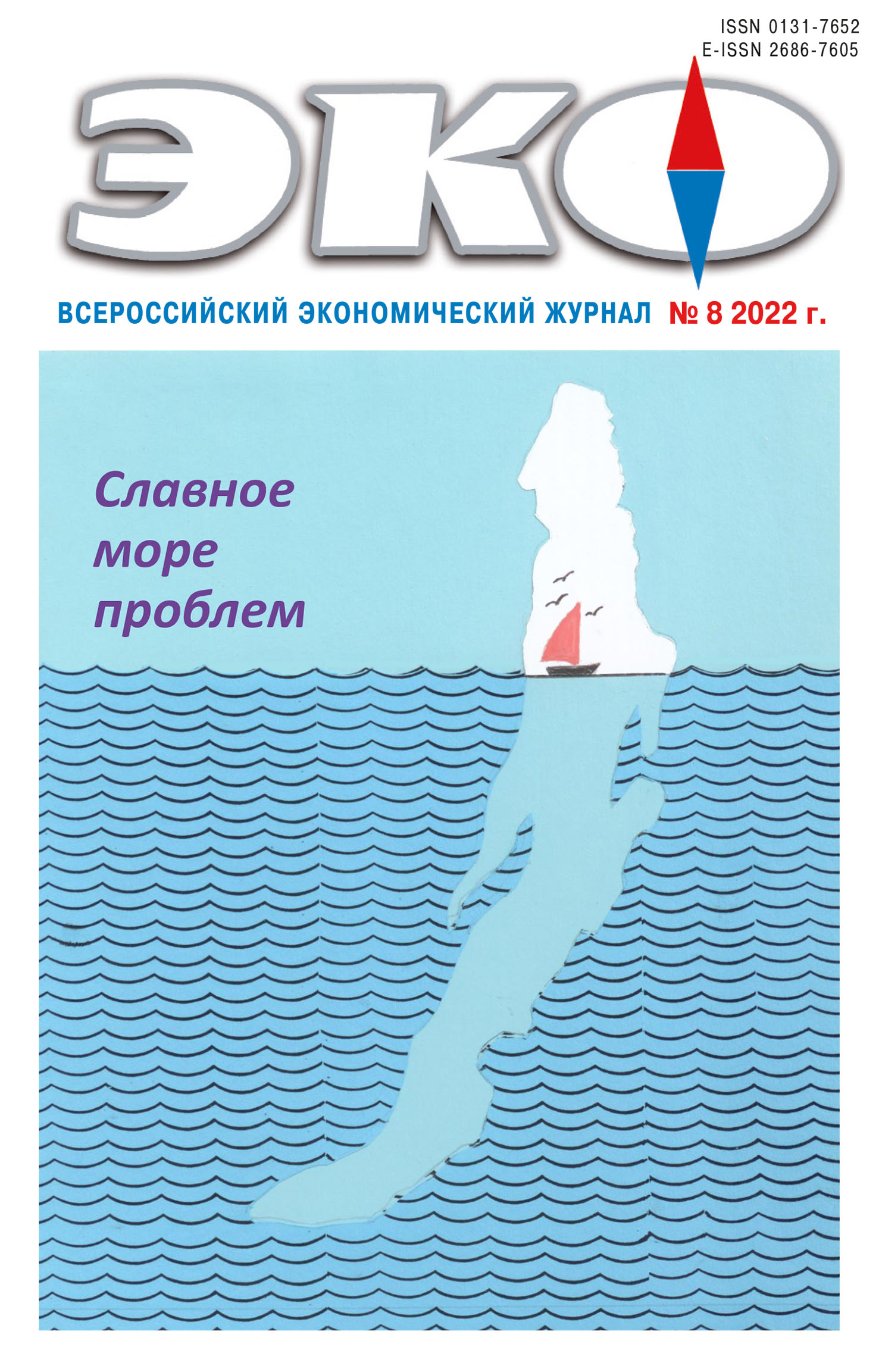ECOLOGY AND ECONOMY
Published 2022-07-26
Keywords
- municipal solid waste; waste processing; greenhouse gases; green growth; Russia; Murmansk Region
How to Cite
1.
Klyuchnikova Е, Orlov А, Korppoo А. Solid Municipal Waste Recycling Industry on the Track to Green Growth. ECO [Internet]. 2022 Jul. 26 [cited 2026 Jan. 15];52(8):67-88. Available from: https://ecotrends.ru/index.php/eco/article/view/4489
Abstract
The paper analyzes the national (Russian Federation) and regional (Murmansk region) policy in the sphere of waste management from the position of the concept of “green growth” and gives the ecological and economic assessment of its future effects. The research is carried out on the example of the Murmansk region, the Arctic region with the developed infrastructure on waste processing. A waste incineration plant and a waste sorting complex are already operating in the region. Extrapolation of the results obtained for the Murmansk Region to the level of the Russian Federation as a whole made it possible to conclude that in case of utilization of MSW disposed at landfills in 2020, Russia could reduce greenhouse gas emissions (in CO2 – equivalent) by an amount comparable to the emissions of a country like Algeria. The study found that the main obstacle to the complete recycling of MSW in the Murmansk Oblast is the lack of profitable markets for secondary raw materials. At the same time, high investment and operating costs in the creation of a new system of waste management aimed at increasing the share of MSW recycling have led to an increase in utility payments. To reduce operating costs and increase the profitability of the created system it is recommended to sort waste directly at the source of its formation.References
- Аладышкина А. С., Лакшина В. В., Леонова Л. А. Исследование готовности жителей Нижнего Новгорода к раздельному сбору твердых коммунальных отходов. В сб.: Стратегии и инструменты экологически устойчивого развития экономики. РОЭЭ-2019. Материалы 15-й Международной научно-практической конференция Российского общества экологической экономики 2–5 июля 2019 года г. Ставрополь, г. Кисловодск, Россия, 2019. С. 178–191.
- Бабанин И. Мусорная революция: Как решить проблему бытовых отходов с минимальными затратами. Greepeace, 2008 [Эл. ресурс]. URL: http://ecoportus.ru/node/460 (дата обращения: 14.03.2022).
- Иванова Н. И., Левченко Л. В. «Зеленая» экономика: сущность, принципы и перспективы // Вестник Омского ун-та. Сер. «Экономика». 2017. № 2 (58). С. 19–28.
- Ключникова Е. М. Эколого-экономические проблемы устойчивого развития и их решение на уровне муниципальных образований // Проблемы современной экономики. 2008. № 2 (26). С. 326–328. Приложение к статье. [Эл. ресурс]. URL: http://www.municipal-sd.ru/sites/default/files/2.1.add-kluchnikova.pdf (дата обращения: 14.03.2022).
- Ключникова Е. М., Корппоо А. М. Реализация концепции «зеленого роста» в российской Арктике (на примере Мурманской области) // Арктика: экология и экономика. 2021. Т. 11. № 4. С. 493–503. DOI: 10.25283/2223–4594–2021–4–493–503
- Ключникова Е. М., Маслобоев В. А. Эколого-экономический анализ региональной политики в сфере обращения с отходами (на примере Мурманской области) // Вестник МГТУ. Труды Мурманского государственного технического университета. 2013. Т. 16. № 2. С. 233–241.
- Пахнин М. А., Экономика изменения климата: Нобелевская премия 2018 г. Уильяма Нордхауса// Экономическая теория. Т. 16. № 1. 2020. С. 5–22. DOI 10.31085/1814–4802–2019–15–2–3–17
- Climate Watch. CAIT data. GHG Emissions. Washington, DC: World Resources Institute. Available at: climatewatchdata.org/ghg-emissions [Internet]. 2020. Available аt: climatewatchdata.org/ghg-emissions
- De Feo G, Polito A. R. Using economic benefits for recycling in a separate collection centre managed as a “reverse supermarket”: A sociological survey. Waste Manag. 2015 Apr 1;38:12–21.
- Etminan M., Myhre G., Highwood E. J., Shine K. P. Radiative forcing of carbon dioxide, methane, and nitrous oxide: A significant revision of the methane radiative forcing. Geophys Res Lett. 2016;43(24):12,614–12,623.
- Ferronato N., Torretta V. Waste Mismanagement in Developing Countries: A Review of Global Issues. Int J Environ Res Public Health. 2019 Mar;16(6):1060.
- Jacobs M. ‘Green Growth’ // Handbook of Global Climate and Environmental Policy / R. Falkner (ed.). Oxford: Wiley Blackwell, 2013. P. 197–214.
- Hallegatte S., Heal G., Fay M., Treguer D. From growth to green growth – a framework, NBER: Working Paper 17841 / National Bureau of Economic Investigation. [S. l.], 2012. URL: http://www.nber.org/papers/w17841
- Hoogmartens R, Eyckmans J, Van Passel S. Landfill taxes and Enhanced Waste Management: Combining valuable practices with respect to future waste streams. Waste Manag. 2016. Sep 1;55. Р. 345–354.
- IPCC. Climate Change 2013: The Physical Science Basis. Contribution of Working Group I to the Fifth Assessment Report of the Intergovernmental Panel on Climate Change [Stocker, T.F., D. Qin, G.-K. Plattner, M. Tignor, S. K. Allen, J. Boschung, A. Nauels, Y. Xia, V. Bex and P. M. Midgley (eds.)]. Cambridge University Press, Cambridge, United Kingdom and New York, NY, USA, 1535. P. 2013.
- Iravanian A Ravari S. O. Types of Contamination in Landfills and Effects on The Environment: A Review Study. IOP Conf Ser Earth Environ Sci. 2020 Dec;614:012083.
- Kormi T., Bel Hadj Ali N., Abichou T., Green R. Estimation of landfill methane emissions using stochastic search methods. Atmospheric Pollut Res. 2017 Jul 1;8(4). Р. 597–605.
- Mataloni F., Badaloni C., Golini M. N., Bolignano A., Bucci S., Sozzi R., et al. Morbidity and mortality of people who live close to municipal waste landfills: a multisite cohort study. Int J Epidemiol. 2016 Jun;45(3). Р. 806–815.
- Mattiello A., Chiodini P., Bianco E., Forgione N., Flammia I., Gallo C., et al. Health effects associated with the disposal of solid waste in landfills and incinerators in populations living in surrounding areas: a systematic review. Int J Public Health. 2013 Oct;58(5). Р. 725–735.
- Tait P. W., Brew J., Che A., Costanzo A., Danyluk A., Davis M., et al. The health impacts of waste incineration: a systematic review. Aust N Z J Public Health. 2020;44(1). Р. 40–48.
- Turner D. A., Williams I. D., Kemp S. Greenhouse gas emission factors for recycling of source-segregated waste materials. Resour Conserv Recycl. 2015. Dec 1;105. Р.186–197.
- Vinti G., Bauza V., Clasen T., Medlicott K., Tudor T., Zurbrügg C., et al. Municipal Solid Waste Management and Adverse Health Outcomes: A Systematic Review. Int J Environ Res Public Health. 2021 Jan;18(8):4331.

